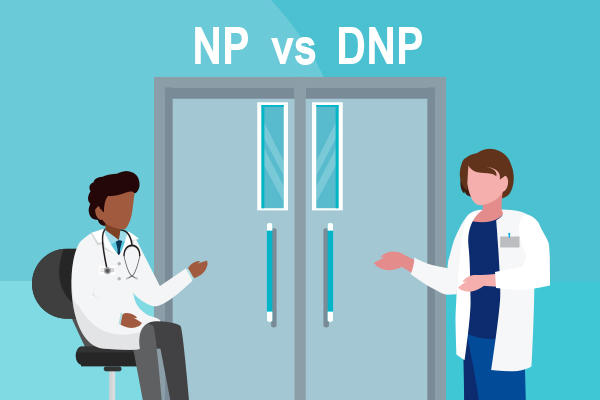Featured
Tags
Share
- Home / Blog / Nursing Today / DNP vs. NP: What’s the Difference?
DNP vs. NP: What’s the Difference?

The difference between DNP and NP is much more than just one letter. If you’re exploring Chamberlain University and its nursing programs, you may also want to explore the DNP vs. NP differences.
First, let’s decipher the DNP vs. NP acronyms, in case they are unfamiliar to you. DNP stands for Doctor of Nursing Practice. NP stands for nurse practitioner. Read on to learn about DNP vs. NP requirements, including education, training, scope of practice and more.
DNP vs. NP at a Glance
|
Category |
DNP |
FNP |
|
Objective |
Influence patient care in significant ways |
Provide preventive and primary care for patients of all ages |
|
Requirements |
|
|
|
Coursework/Curriculum |
A practice-focused curriculum that lets you choose an elective focus to tailor your curriculum to your career goals:
|
A career-focused program that translates theory into practice. Work alongside an experienced care provider during your practicum experience. |
|
Clinical Hours |
1,024 post-baccalaureate hours which may include up to 512 hours completed in master’s degree program |
500 hours |
|
Program Goals |
The DNP degree program is designed to prepare RNs for the highest level of professional nursing practice. |
The MSN FNP degree program helps prepare you to sit for board or credentialing exams and to meet licensing requirements. |
|
Career Opportunities |
Advance your nursing career on the clinical/practice side and pursue opportunities in high-level leadership, clinical education and healthcare policy. |
Assess, diagnose and treat patients as their ongoing point of contact for medical care.
|
What Is a DNP Degree?
A Doctor of Nursing Practice (DNP) is a post-master’s degree, also known as a terminal degree. A DNP degree program prepares nurses for roles in advanced clinical practice and healthcare leadership.
A DNP degree is on par with a Doctor of Philosophy, or a PhD degree in nursing, but the DNP focuses on nursing practice rather than research. So, instead of conducting nursing research or teaching at the college level, DNP-prepared nurses might provide direct patient care, provide clinical training for nurses and NP students, serve on hospital boards or in nursing administrative roles, or work on emerging health policies.
Chamberlain’s DNP degree coursework focuses not only on more advanced clinical practice skills, but on high-level organizational skills like leadership, program management, healthcare administration and health policy. The DNP curriculum includes courses on topics like project management and fiscal analysis, nursing informatics, and healthcare policy and leadership.
DNP students also participate in a practicum when earning Chamberlain’s Doctor of Nursing Practice degree. Doctoral candidates complete a project that includes a process improvement, quality improvement or another action that impacts patient care outcomes.
What Is an NP?
Nurse practitioner is title bestowed upon nurses who have earned a master’s degree and completed additional clinical training that qualifies them to become certified in one or more specialties. Nurse practitioners may prepare at the master’s level or they can earn a DNP degree.
An NP is one of four advanced practice registered nurse (APRN) roles. The others are certified nurse-midwife, certified registered nurse anesthetist and clinical nurse specialist. APRN roles require a nurse to hold at least a master’s degree and acquire additional clinical training beyond the requirement for an RN license.
NPs must be certified by an accredited certification body. While nurse practitioners can choose from multiple certifications and practice areas, 88% of NPs choose primary or family care as their focused area of practice. You can specialize your nursing education by earning Chamberlain’s MSN - Family Nurse Practitioner (FNP) degree. Chamberlain also offers NP clinical practice tracks in gerontology and psychiatric-mental health.
Nurse practitioners have been called today’s “health partner of choice” because of the care they provide to so many individuals and families in the United States. An NP’s job duties vary by specialty, but family nurse practitioners, for example, deliver a range of acute, chronic and preventive healthcare services. Besides diagnosing and treating illness, FNPs perform routine checkups, give health risk assessments and administer immunizations and screening tests. They offer personalized counseling on preventing illness and maintaining a healthy lifestyle.
Which Should I Choose: DNP vs. NP?
As you explore DNP vs. NP programs, consider your future professional goals as you prepare to make your decision.
A family nurse practitioner master’s program prepares you to take your nursing practice to the next level. As an FNP, you’ll have the autonomy to perform tasks like diagnosing patients, managing their care and prescribing medications.
DNP credentials can open doors to high-level opportunities within the healthcare profession. You might choose to pursue career roles in healthcare administration or nursing leadership, or as a clinical nurse faculty member.
Here’s a further comparison of the features of Chamberlain’s DNP and MSN FNP programs to help guide you as you explore DNP vs. FNP options:
|
|
DNP |
MSN FNP |
|
Education Required for Admission |
Master’s degree in nursing or higher |
Bachelor’s degree in nursing or higher |
|
Length of Study |
As few as 6 semesters, or 2 years |
As few as 8 semesters, or 2.5 years |
|
Career Fields |
Clinical, leadership, clinical faculty, administrative, health policy, program management |
Clinical – multiple specialty and subspecialty areas, clinical-based research |
|
Certification Exam Required |
No |
Yes |
Additional DNP vs. NP FAQs
Is there a difference between DNP and NP?
A DNP is a Doctor of Nursing Practice degree and a nurse practitioner (NP) is the title bestowed on a nurse who has at least a Master of Science in Nursing (MSN) degree and has completed the nurse practitioner clinical and didactic requirements.
What’s the difference between DNP and FNP?
Comparing DNP vs. FNP is like comparing DNP vs. NP. An FNP is a family nurse practitioner or an NP who provides patient care in a family practice setting, treating patients of all ages. A DNP is a Doctor of Nursing Practice degree.
Is a doctorate required for nurse practitioners?
No, a doctorate is not required for nurse practitioners at this time. However, several nursing organizations, including the American Association of Nurse Practitioners (AANP) and the American Association of Colleges of Nursing (AACN), support a movement to require a DNP degree as the entry-level education requirement for advanced practice registered nurses (APRNs). The National Organization of Nurse Practitioner Faculties (NONPF) wrote a position paper in 2018 calling for all new NPs to be educated at the doctorate level by 2025.
DNP vs. NP: Which one is higher?
One is not higher than the other. They are different. DNP is an educational degree while NP is a certification. An NP is a master’s- or doctorate-prepared nurse who is certified and licensed as an advanced practice registered nurse (APRN). A DNP is a higher education degree. An NP can earn a DNP degree, but a DNP-prepared nurse does not have to be an NP.
What can a DNP do that an NP cannot?
A DNP-prepared nurse has a deep knowledge of evidence-based care and the ability to apply this knowledge in practice. A DNP nurse can influence healthcare policies, take on administrative roles and provide clinical education for nursing programs. An NP without a DNP degree has not reached a terminal educational level that might be required for some roles.
So, DNP vs. NP? We hope learning more about NP vs. DNP helps you make your decision. Our admission team can give you more information about FNP and DNP program requirements, nursing degree start dates and more. Get started online and begin your higher education journey to a rewarding career.
Chamberlain University, an accredited institution, offers bachelor’s, master’s, doctoral and certificate programs in nursing and healthcare professions. With a growing network of campuses and robust online programs, Chamberlain continues to build on more than 130 years of excellence in preparing extraordinary healthcare professionals.
By Cindy Blye
More from Nursing Today
Request More Information
To receive the Chamberlain University Program Guide, including associated career paths, please select a program of study.







